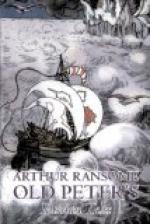Outside the church were rows of short posts, with long rough fir timbers nailed on the top of them, to which the country people tied their horses when they came to church. There were several carts there already, with bright-coloured rugs lying on the hay in them; and the horses were eating hay or biting the logs. Always, except when the logs are quite new, you can tell the favourite places for tying up horses to them, because the timbers will have deep holes in them, where they have been gnawed away by the horses’ teeth. They bite the timbers, while their masters eat sunflower seeds, not for food, but to pass the time.
“Now then,” said old Peter, as he got down from the cart, tied the horse, gave him an armful of hay from the cart, and lifted the children out. “Be quick. We shall be late if we don’t take care. I believe we are late already.—Good health to you, Fedor,” he said to an old peasant; “and has the baby gone in?”
“He has, Peter. And my health is not so bad; and how is yours?”
“Good also, Fedor, thanks be to God. And will you see to these two? for I am a godparent, and must be near the priest.”
“Willingly,” said the old peasant Fedor. “How they do grow, to be sure, like young birch trees. Come along then, little pigeons.”
Old Peter hurried into the church, followed by Fedor with Vanya and Maroosia. They all crossed themselves and said a prayer as they went in.
The ceremony was just beginning.
The priest, in his silk robes, was standing before the gold and painted screen at the end of the church, and there were the basin of holy water, and old Peter’s sister, and the nurse Babka Tanya, very proud, holding the baby in a roll of white linen, and rocking it to and fro. There were coloured pictures of saints all over the screen, which stretches from one side of the church to the other. Some of the pictures were framed in gilt frames under glass, and were partly painted and partly metal. The faces and hands of the saints were painted, and their clothes were glittering silver or gold. Little lamps were burning in front of them, and candles.
A Russian christening is very different from an English one. For one thing, the baby goes right into the water, not once, but three times. Babka Tanya unrolled the baby, and the priest covered its face with his hand, and down it went under the water, once, twice, and again. Then he took some of the sacred ointment on his finger and anointed the baby’s forehead, and feet, and hands, and little round stomach. Then, with a pair of scissors, he cut a little pinch of fluff from the baby’s head, and rolled it into a pellet with the ointment, and threw the pellet into the holy water. And after that the baby was carried solemnly three times round the holy water. The priest blessed it and prayed for it; and there it was, a little true Russian, ready to be carried back to its mother, Nastasia, who lay at home in her cottage waiting for it.




